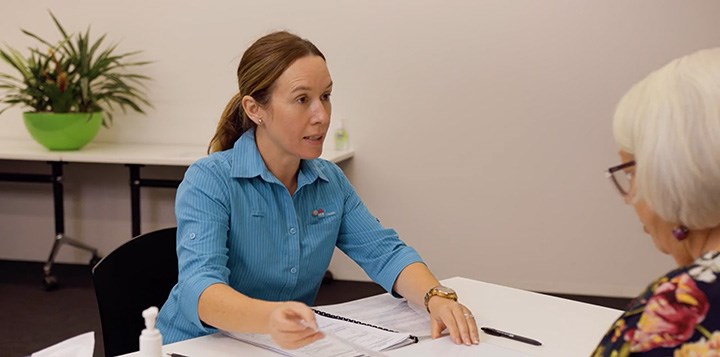Cognition and cognitive screening

This suite of five modules focuses on cognition after stroke (Module A), and on using the Oxford Cognitive Screen (OCS) to assess post-stroke cognitive impairments (Modules B to E).
The OCS licence (and screening tools for approved versions) are freely available for publicly funded clinical and research use.
If you plan on using the OCS at your site, you will need an OCS licence and the OCS screening materials relevant to your country.
Australia
If your Health Service/site/you already have an OCS licence, contact the UK OCS team at healthoutcomes@innovation.ox.ac.uk to obtain the OCS-AU materials.
NSW Health has a statewide licence for all NSW Health sites to use the OCS-AU. Theses OCS modules can be completed on My Health Learning, so it is recorded in your Health Education Record. Please refer to the Agency for Clinical Innovation for instructions on how to obtain the OCS materials, including state-wide forms approved for the patient medical record.
It will be useful to refer to the OCS materials while completing this module (hard or electronic version) i.e. country-specific (User Manual, Patient Pack and Test Booklets for Version A or B) or the sample download of the UK OCS Patient Pack and Test Booklet.
Target audience
The modules are aimed at qualified clinicians (occupational therapists, speech pathologists, psychologists, physiotherapists and specialist nurses) working with people after a stroke. Clinicians administering the OCS and reporting the results need to have sufficient clinical knowledge to understand and interpret cognitive impairments occurring in stroke.
Acknowledgements
These modules have been developed through a collaboration of:
- Colette Sanctuary (Stroke OT, OCS-AU Project Officer), Luisa Hewitt (Stroke Speech Pathologist, OCS-AU Project Officer) and Dr Di Marsden (Manager, Stroke Projects and Education), Hunter Stroke Service, Hunter New England Local Health District, NSW, Australia
- Stroke Network, NSW Agency for Clinical Innovation, NSW, Australia
- Associate Professor Nele Demeyere (Senior Clinical Neuropsychologist), Oxford University, UK, who, along with her colleagues, developed the Oxford Cognitive Screen.
- Joe Hughes (Creative Producer, Director), Magpie Creative, NSW, Australia.
with additional collaborators for Module A:
- Professor Rene Stolwyk (Senior Clinical Neuropsychologist), Turner Institute for Brain and Mental Health, Monash University, Victoria, Australia
- Dr D. Vincent Oxenham (Senior Clinical Neuropsychologist), Royal North Shore Hospital and Macquarie University, NSW, Australia.
Learning objectives
- describe common cognitive impairments post stroke
- identify stroke guideline recommendations for cognitive screening after stroke
- list cognitive screening tools frequently used after a stroke
- identify limitations undertaking cognitive screening.
B: Introducing the Oxford Cognitive Screen
- understand why and how the OCS was developed
- describe why the OCS is appropriate for use with people after stroke
- understand the different cognitive domains within the OCS cognitive wheel
- understand how to apply for an OCS license.
C: Administering the Oxford Cognitive Screen
- be able to complete the OCS (version A and B)
- have the knowledge and skills required to administer the OCS.
D: Scoring and interpreting the Oxford Cognitive Screen
- accurately score the OCS
- interpret OCS scoring results
- understand and successfully complete the OCS cognitive profile wheel
- identify common errors and clinical questions with the OCS.
E: Documenting and reporting the Oxford Cognitive Screen results
- document and report the OCS results clearly in medical records
- describe possible functional cognitive implications identified through OCS screening
- understand why it is important to provide feedback to a participant, their family and carers
- describe how to use OCS results to guide patient/participant management
- understand when it may be appropriate to do further cognitive assessment(s).


